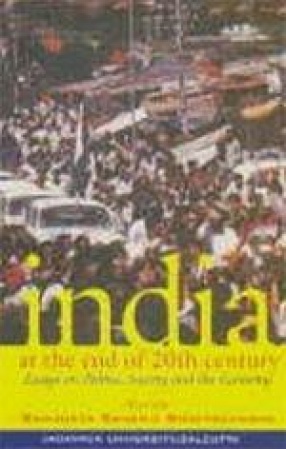India at the End of the Twentieth Century : Essays on Politics, Society and the Economy
Synopsis
At the end of one century and the beginning of another, it is time to take stock. India as an independent, democratic republic has been in existence for only around half a century. Other major democracies which are now being called post-modern, are far older. However, the civilizational forces which make a country what it is, have been in operation in India for thousands of years. Apart from the positive influences of its past, the country also has to carry an enormous historical baggage. Although there was a great degree of progress in the second half of the twentieth century in terms of parliamentary democracy, industrialization, social welfare activities, etc., which can be measured in empirical terms, its ‘historical baggage’ reflected in its one billion population with all its diversities, ethnic, religious, provincial, linguistic, economic, caste and class, has at times, slowed it down. In addition, the new realities of the twentieth century, have created new tensions between social forces, new stumbling blocks on the path to progress. So where do we stand at the end of the twentieth century? We are the ‘largest’ democracy, but now viable is our present form of government? Our per capita income is low, but is the rate of capital accumulation/formation the same for all regions and all sections of the people? Have economic discrepancies fuelled centrifugal tendencies or are ethno-religious causes responsible? What has been the effect of globalization on the Indian economy? And now that the Cold War is over, and we have also decided to go overtly nuclear, quo vadis our foreign policy? India at the End of the Twentieth Century is an attempt to analyze these and many more issues which are of concern to the nation at the turn of the century. The book is multidisciplinary because the problems which face us today are not restricted to any one area. Women, for instance, are under-represented in politics as well as in the decision making levels of the work force, making them the recipients of decisions taken by men on matters which are of vital concern to them (and sometimes them alone), thus relegating them to a kind of unequal status in society. This book, therefore, has, as its title denotes, essays on politics, the civil society and the economy. The essays not only provide an analytical retrospective study of the past 50 years or so, but give suggestions regarding the path that Indian should take in the coming years.
Read more
27.55
24.795
$
29.00 $
Free delivery Wolrdwidе in 10-18 days
Ships in 1-2 days from New Delhi
Membership for 1 Year $35.00
Get it now and save 10%
Get it now and save 10%
BECOME A MEMBER







Bibliographic information